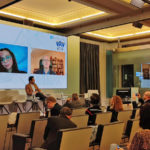The ‘Construction Blueprint’ project bids farewell after more than four years of work by organising a European event on ‘The new strategic sectoral approach to skills cooperation in the construction sector’, in Brussels and with live streaming
On 22 February, the Construction Blueprint partners held the final event of the European project, co-funded by the European Commission’s Erasmus+ programme, to discuss the skills needed in the construction workforce to cope with the European Renovation Wave. The conference focused on ‘The new strategic sectoral approach to skills cooperation in the construction sector’, in Brussels and was streamed live on the Zoom platform. The event, moderated by journalist Alex Puissant, was conducted in English with simultaneous translation into Spanish and French, and was structured in three parts.
Part One
The welcome words were given by Nicolas Schmit, EC Commissioner for Employment and Social Rights, who underlined that “the ecological transition forces us all to change the way we work and live. This affects the construction sector significantly, as new building techniques are required to achieve zero emissions and secure energy. In addition, labour shortages continue to hit the sector and highlight the need for more skilled workers. It is therefore important at this point to make the construction sector more attractive, especially for young people, and to provide the right skills and approaches”.
Javier González, Director of Training and Employment at the Fundación Laboral de la Construcción, as leader of the Construction Blueprint, then highlighted the value of the project and its relevance for the construction sector, highlighting the cooperation that has taken place between the 24 partners during more than four years of work of the consortium.
Part two
This consisted of three round tables in which the main sectoral actors addressed the skills that current construction professionals must possess to face the Renovation Wave’, in relation to Energy Efficiency, the Circular Economy and the Digitalisation of the sector:
- Round table on Digital skills, with the participation of: Ilektra Papadaki, Team Leader for Construction and the Built Environment at the EC Directorate-General for Internal Market, Industry, Entrepreneurship and SMEs (DG GROW); Žiga Turk, Professor of Computerised Construction at the Faculty of Civil and Geodetic Engineering at the University of Ljubljana (Slovenia); and Tom Deleu, General Secretary of the European Federation of Building and Wood Workers (EFBWW). The latter explained that “trade unions welcome digitalisation as a driver towards higher quality jobs and to reduce exposure to unsafe and unhealthy working conditions. But digitalisation and innovation are today hampered by business models based on cheap labour. This must change. And social dialogues are the best way to agree on a framework for an inclusive, fair, and equal digital transformation”.
- Roundtable on Skills in the Circular Economy, with the participation of: Anders Lindholm, Education Counsellor and Permanent Representative of Sweden to the European Union; Seamus Hoyne, Director of Industry Engagement at Shannon Midlands Midwest University of Technology TUS; and Domenico Campogrande, Director General of the European Construction Industry Federation (FIEC), who stated that: “If we really want to achieve the goals of the green and digital transitions, we also need to make significant additional efforts for the ‘skills transition’. And this requires closer cooperation between all stakeholders: companies, workers’ representatives, public authorities, training bodies”.
- Round table on Energy Efficiency Skills, with the participation of: Ciaran Cuffe, MEP (Greens, Ireland) and rapporteur for the European Parliament’s Committee on Industry, Research and Energy (ITRE); Stelina Chatzichristou, expert in VET research and policy analysis at the European Centre for the Development of Vocational Training (CEDEFOP); and Fernando Sigchos, Secretary General of the European Builders Confederation (EBC), who underlined that “the importance of renovating buildings to make them more energy efficient, and therefore the need to properly train the professionals in charge of achieving these ambitions, now seems obvious. Vocational training for the construction sector must therefore be prioritised, strengthened, better financed and redefined, in order to have enough skilled employers and workers and a real chance of achieving the European environmental and energy objectives by 2050”.
Part Three
The end of the meeting focused on the Pact for Skills in Construction, in which Stefan Hump, co-founder and CEO of 3S and consortium support coordinator for the sector’s Pact, highlighted the challenges and opportunities of joining the Pact, with an emphasis on the institutions that are part of the consortium.
His presentation was followed by a panel discussion with the participation of: Katharina Knapton-Vierlich, Head of Unit for Construction Policy in the EC Directorate-General for Internal Market, Industry, Entrepreneurship and SMEs (DG GROW); Felix Rohn, policy officer in the EC Directorate-General for Employment, Social Affairs and Inclusion (DG EMPL); Andrea Oel-Brettschneider, Head of the Brussels Office of the German Construction Federation (ZDB), a member of the Pact; and Lara Paemen, Director General of the International Facility Management Association (IFMA), which is considering joining the Pact.
Among the conclusions, Katharina Knapton-Vierlich highlighted that: “The European Commission is working towards a sustainable, digital and robust construction ecosystem, in which skills play a key role. Construction and the built environment shape our private and professional lives, and safe and energy efficient buildings are essential”.
Finally, the meeting closed with a family photo of the Pact members and future signatories.












